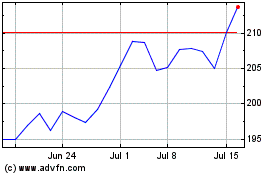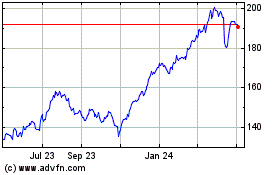By Bob Davis, Ruth Simon and Peter Rudegeair
The federal government's $350 billion small business loan
program got off to a rocky start Friday, with some of the nation's
biggest lenders saying they weren't yet able to process loan
applications, discouraging business owners struggling to stay
afloat.
"I've driven around the Los Angeles area for three hours and
called several banks," said Paulo Amaral, the founder of Ally
Right, a Los Angeles-based startup that helps make websites
accessible to people with disabilities. "No luck at all."
By around 4:30 p.m., at least 9,779 loans worth about $3.2
billion had been approved, according to Small Business
Administration chief Jovita Carranza, who was providing a running
count on Twitter. Michael Strain, an economist at the American
Enterprise Institute, calculated that half that amount would keep
around 400,000 employed for the next eight weeks.
But with millions of people losing their jobs weekly, that is "a
drop in the bucket," said Brock Blake, the chief executive of
Lendio Inc., a technology firm that matches lenders with
small-business borrowers.
Friday was the first day for the new Paycheck Protection
Program, a part of the $2 trillion stimulus package designed to
address the economic fallout of the novel coronavirus pandemic.
Businesses with 500 employees or fewer are eligible for the
loans, which have a 1% interest rate and are designed to keep
employees on the payrolls for eight weeks, limiting the mounting
ranks of workers applying for unemployment checks. If a borrower
doesn't lay off workers, the government plans to forgive the loan,
including interest. Borrowers may also use the money for rent and
utilities.
Many of the nation's biggest banks, including JPMorgan Chase
& Co., Citigroup Inc. and Wells Fargo & Co., said Friday
morning they weren't yet ready to take loan applications. By Friday
afternoon Chase said borrowers with a business checking account
could start applying for the loans online; but the bank warned of
possible "processing delays and system failures" due to high volume
and told customers that some applications wouldn't be approved by
the SBA, given limited funds.
One reason many banks weren't ready to process applications was
a delay in getting final rules about the program from the Treasury
Department and SBA, as well as uncertainty about what kinds of
documentation will be accepted to qualify prospective borrowers.
The government didn't release final versions of the documents that
must be filed by borrowers and lenders until Thursday night.
Bank of America Corp. started accepting applications Friday
morning and had received more than 85,000 for loans totaling $22.2
billion as of 5 p.m., a spokeswoman said. But the bank said it is
only considering customers with both outstanding loans and deposit
accounts in order to speed up the approval process.
"First, we have to focus on the borrowing clients to make sure
we can take care of them," Bank of America CEO Brian Moynihan said
on CNBC. "And then secondly the people with the core relationship
that don't borrow, we'll handle them also."
Sen. Marco Rubio, chairman of the Senate Small Business
Committee, criticized the bank and said it should receive all
comers. "This money is 100% guaranteed by fed govt," the Florida
Republican said in a tweet.
Based on Ms. Carranza's figures, the average loan amount
approved was about $325,000. At that rate, the roughly $350 billion
allotted by Congress would run out after one million applications
are approved. The government has said it approves loans on a
first-come, first-served basis.
"If funds run low, there will be immense political pressure on
Congress for funding to make sure that people aren't shut out
because they are at the end of the queue," said Harris Simmons, CEO
of Zions Bancorp, a big Utah lender.
Treasury Secretary Steven Mnuchin has said he would ask Congress
for more money if the Paycheck Protection Program needs more
funding.
About one-fourth of small businesses have already closed,
according to a survey of 500 firms released Friday by the U.S.
Chamber of Commerce and MetLife. Another 40% said it is likely they
will have to close at least temporarily within the next two
weeks.
Questions about the program remained even as it got under
way.
One issue is whether the 1% interest rate is simple interest or
compounded and what banks should do in case borrowers miss
payments, said Scott Pearson, a financial services expert at the
law firm of Manatt, Phelps & Phillips.
Also missing was a standard loan agreement that sets out the
terms of the loan and conditions.
Chris Hurn, chief executive of Fountainhead Commercial Capital,
a nonbank lender that specializes in SBA loans, said that as of
Friday he was still awaiting guidance from the SBA on several
issues, including how to submit the forms that both applicants and
lenders are required to fill. Mr. Hurn said he couldn't begin
processing applications without such guidance.
The SBA didn't respond to a request for comments on the
complaints.
Other small-business owners say they are frustrated by policies,
such as the one outlined by Bank of America, that put certain
customers ahead of others. Giving those with existing lending
relationships priority penalizes small businesses that have taken a
prudent approach to debt, but are still suffering financially from
the pandemic.
Jen Storey, co-owner of Redhill Painting in San Francisco, has a
business checking account with Bank of America and a business
credit card with JPMorgan Chase. She said the eight-person company
that she and her husband have run since 2004 doesn't meet the
standards for processing the new SBA loans set by either bank.
Mr. Amaral of Ally Right said he rose before sunrise to get an
early start applying for a loan at a local SBA lender listed on the
agency's website. The lender closest to his home said it no longer
makes SBA loans, the second didn't know anything about the new
program and the third was closed because of the Covid-19 virus. He
also tried Wells Fargo, where he has business and personal banking
accounts, but said bank employees didn't know about the
program.
A Wells Fargo spokeswoman said the bank would only accept
applications for the loans online and that it has signs in its
branches informing customers of that policy.
Some banks were working hard to update their systems to deal
with what they expected to be an avalanche of loan applications.
Boston-based Eastern Bank won't begin processing applications until
next week because it needs to update its technology, according to
Quincy Miller, the bank's president and vice chair.
Mr. Miller said guidance came too late from federal agencies to
make all the necessary changes in time to start processing the
loans Friday. Once the bank gears up, it will give priority to
applications from customers that have any existing relationship
with Eastern Bank.
Live Oak Bancshares, Inc., the largest lender in an SBA flagship
program, said it is working through a pipeline of over 1,000 loan
applications from its roughly 4,000 existing customers. Then, it
plans to open up the program to businesses near its North Carolina
headquarters followed by new customers in the big industries it
serves, which include veterinary offices and chicken farms
The bank submitted its first paycheck protection loan
application to the administration at 4 a.m. Friday, said Huntley
Garriot, president of the Wilmington, N.C.-based bank. It took more
than one try.
By Friday afternoon, the bank received its first loan
authorizations from the SBA, and it hoped to get the money out to
customers either by the end of the day or Monday.
Mr. Simmons, the Zions CEO, said his firm will be working
through the weekend to catch up with the applicants that want to
file loans. He said the bank is training 3,000 of its 10,000
employees to handle the paycheck loans. "We want people who can
answer questions" from borrowers, he said.
Becky Feinberg-Galvez, chief executive at Chicago-based
Shop4Ties, a custom apparel company, had hoped to apply on Friday
for a loan through Citibank, but received an email saying the bank
wasn't yet prepared to accept applications.
"I don't blame [Citibank] obviously. I just think it's
frustrating there's no finality and nobody can give you an answer,"
Ms. Feinberg-Galvez said.
--Amara Omeokwe and Yuka Hayashi contributed to this
article.
Write to Bob Davis at bob.davis@wsj.com, Ruth Simon at
ruth.simon@wsj.com and Peter Rudegeair at
Peter.Rudegeair@wsj.com
(END) Dow Jones Newswires
April 03, 2020 19:14 ET (23:14 GMT)
Copyright (c) 2020 Dow Jones & Company, Inc.
JP Morgan Chase (NYSE:JPM)
Historical Stock Chart
From Mar 2024 to Apr 2024

JP Morgan Chase (NYSE:JPM)
Historical Stock Chart
From Apr 2023 to Apr 2024
